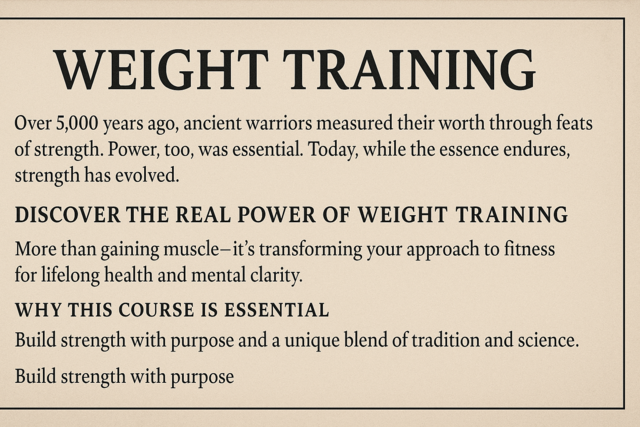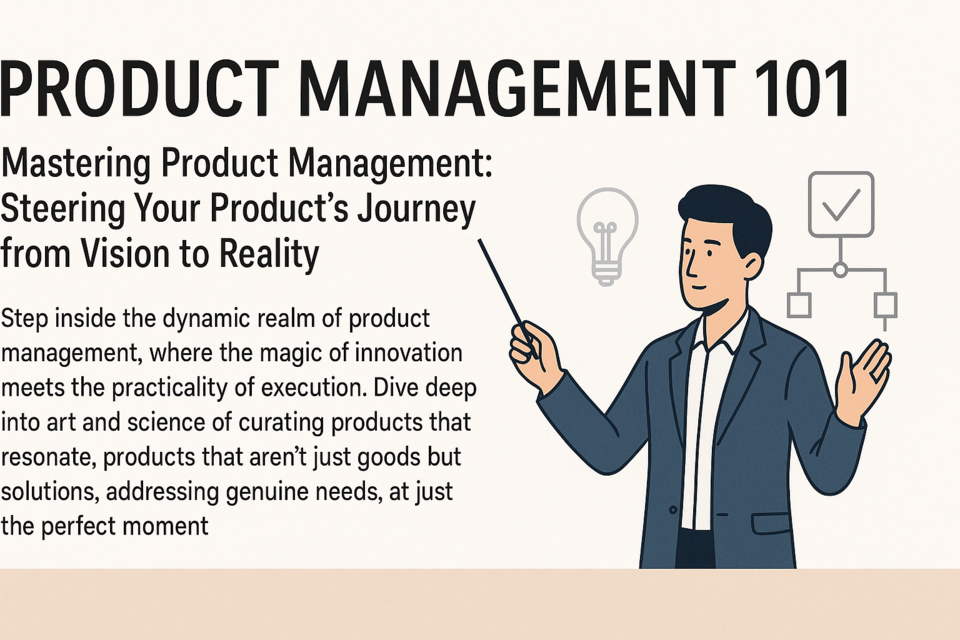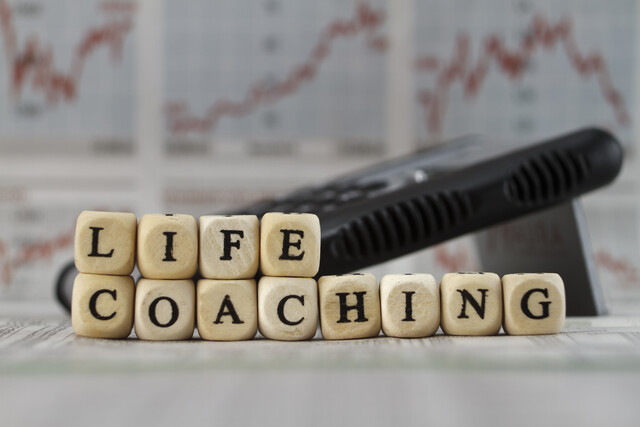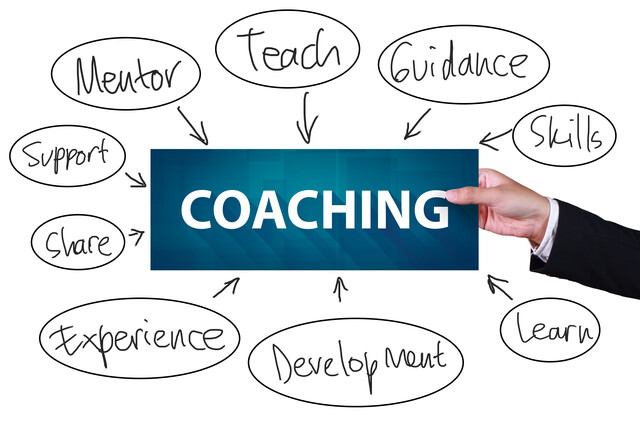Understanding Why We Resist Change in Life Coaching
You have heard the phrase, "I'm in a rut."
When we resist change, it is often because we are in a rut of sorts.
Scientists at the Massachusetts Institute of Technology (MIT) have proven that we repeat certain behaviors because our brain is in a rut of sorts. Because of this, it is often very difficult for us to change our behavior.
If you were to fly over the path of the original Oregon Trail today, you would still see the deep gouges and ruts that were created by the many thousands of pioneers who traveled over that road. The first few years, it was difficult to follow the trail and guides were needed. However, over time, the ruts became deeper and more pronounced; so much so that in some areas they are still visible today, more than 100 years later.
In much the same way, your brain responds to repeated stimuli by forming a neurological pathway. Each time a neural pathway is reinforced, it becomes bigger and stronger. With enough conditioning, your brain becomes used to a specific response, and you will find yourself repeating certain behaviors without ever thinking about it.
It has become the path of least resistance. It will be your unconscious response.
The science behind the development of habitual or addictive behavior is rooted in our basal ganglia, the part of the brain that learns by repetition. When we are first learning something, this part of our brain becomes stimulated. As the behavior is repeated, the need for brain stimulation becomes less and less. We have formed a neural pathway in our brain that can work either for us or against us.
This type of learning can work to our advantage so that we can do certain tasks without having to spend a lot of mental energy on them, leaving our brain to think about other things. If we use it this way, we will be efficient and effective.
When we merely allow our brain to think for us, convincing us to merely repeat behavior without consideration of the consequences, we are in peril. This is especially true if those behaviors are negative or no longer work to our advantage.
This information is meant to encourage you. On the one hand, having bad habits such as procrastination or mindless eating or smoking may not really be your fault because your brain has tricked you into believing that this behavior is the path of least resistance, and that is a good thing.
Now that you know this, you no longer can use it as an excuse. Once you identify behavior that is not working to your best advantage, it is time to take steps to change.
Habit
Habits fall under the category of "mindless behavior" described previously. They are behaviors that we do regularly without conscious thought. Most of our habits are created as ways to perform the necessary tasks of daily living. We bathe, eat, and sometimes even talk in a habitual way.
Does anyone say to you, "You always do that!" ?
Most of the time, this is not a compliment. It is intended to draw our attention to an undesirable behavior. This is your cue to pay attention.
Many of our habits have a cost to us. Just as we evaluated the cost of procrastination, we also need to evaluate the cost of bad habits:
1. Time: If you were to add up all the minutes, hours, and even days in which you engage in a behavior, would you be shocked at how many months or years you might have wasted that could have been put to better use?
2. Energy: Our bad habits can rob us of our energy if we have to either cover up the fact that we are still engaged in a bad habit or fix a problem stemming from a bad habit. What if your bad habit is to just toss your clothing on the floor every night, and you never pick it up. After a week, what happens? How much time does it take to pick everything up? Do you know what is clean and what is dirty? Do you have to rewash clean clothes because you cannot tell?
3. Self-esteem: Many times our bad habits make us feel guilty. We know we are engaging in poor behavior, yet we do not do anything to stop it. How does it feel when you get caught? Would you like your boss to know about this habit? Your partner? Your best friend? Do people already know, and you keep saying that you are working on it? How would you feel about yourself if you did not engage in this habit? Would you like to change?
4. Family and friends: Do your bad habits hurt these special people in your life? Are you habitually late? Does that make everyone else late? Do other people like being late? In what other ways do your habits affect them? Do your bad habits keep you from meeting new people who could be helpful to you socially or professionally?
5. Health: This is a big problem area. Many of our bad habits really hurt our health. We eat too much, we eat the wrong things, we do not get enough sleep, we do not exercise, or we drink too much. All of these habitual behaviors hurt our health, and the really crazy thing is that we are fully aware of this!
6. Money: We talked about how not paying bills on time can hurt us. That is just one way we can suffer financially. We could be a slave to a bad habit that could hurt our career in terms of promotions and raises.
Changing habitual behavior can be difficult at best and almost impossible, especially if we try to change too many things at a time. The first step, however, is becoming aware of the habits that we should probably change, and then taking steps to effect that change.
Fear
"Change or die."
We hear that expression a lot, and most of the time it is when we do not want something to change. We might think that we would prefer to die! We resist change because we know it is going to bring about something different, something unexpected.
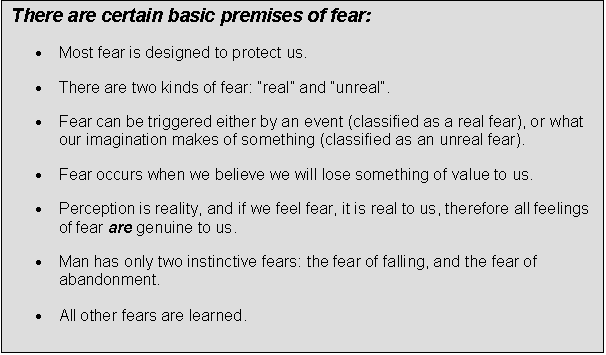 And as we discussed earlier, change translates into fear of the unknown. We do not know what a particular change is going to bring about, and because we fear not knowing this, we will resist change for as long as we possibly can.
And as we discussed earlier, change translates into fear of the unknown. We do not know what a particular change is going to bring about, and because we fear not knowing this, we will resist change for as long as we possibly can.Understanding that most of our fears are learned is a pretty empowering piece of knowledge. If we can learn fear, we can most certainly unlearn it!
Eliminating our fears is not as simple as just willing them away. Eliminating fear, especially fear of the future and the changes that will occur, is a process both for you and for your clients.

Our first reaction to change that is outside our control is usually anxiety and dread. Our imagination is pretty powerful, and unless we choose to look at change as a positive thing, we focus only on what we believe we are going to lose or what will go wrong with that change.
Change that occurs due to our own choice is usually perceived as a good thing, even if it is a frightening thing. Consider the person who decides to leave his corporate job to purse his lifelong dream. The future in this case is very uncertain! Yet, most people who make this type of decision have less fear because they have chosen the change.
Expectations
Changing the way we perceive something will alter our expectations about what is to happen. Change can be a time of anticipation, excitement, and expectation.
This occurs when we are aware of how we react to change.
Seeing our reaction to change as a choice rather than a habitual response empowers us and makes us less resistant. We become focused on the opportunity of the future rather than fearing what we might lose. When we were young, we could not wait for life to start. At some point, we began to fear our future.
Security
Setting Yourself Up to Win
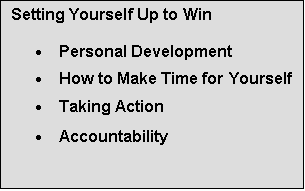
Personal Development
You have heard this term, or maybe you have not.
What does it mean to you?
It typically refers to self-development in which you improve your awareness and knowledge about yourself and your abilities. You might choose to work on developing specific strengths or talents that you have identified in yourself.
The truth of the matter is that we all have areas in our lives that we need to work on. Some of us need to work on our communication. Others need to improve their ability to work with people. Still others feel as though their life is going nowhere, and they do not know how to change that.
Developing yourself takes time. There are no shortcuts. Top athletes and chief executive officers have coaches, why not you? Just imagine the potential of discovering who you are. It is likely your surest road to success.
Personal development is working on yourself to change something about your life that you do not like. It helps you discover your full potential and allows you to achieve the life you believe you want.
|
What are ways you can incorporate personal development into your life? o Some people turn to books or audio recordings, such as those by Stephen Covey or Anthony Robbins. o Other people like to hire life coaches to help them evaluate themselves, their lives, where they are, and where they want to be. |
With that information, we work on creating goals and devising a plan to achieve those goals.
The point of working on a personal development program is to increase the quality of your life, help you fulfill aspirations, and achieve your dreams. If you do not know where you are going in life, it is pretty hard to know when you get there; and most of the time when you travel without a map or global positioning system (GPS), you get lost. Do not get lost in your life. Sit down today and set a goal to improve something.
Creating the life you want is within your reach. We have it within ourselves to shape our destiny. Using the services of a life coach, an individual is essentially on the fast track to self-improvement.
How to Make Time for Yourself
Listen to your life. All around you are noises. We live in a time of fantastic and amazing technology.
We have phones ringing in our cars and in our pockets. Faxes and instant messaging bells go off as constant little alarms, each demanding instant attention. We are always on call, we are always available, always on the go.
Most of the time we justify our activity:
Our day starts with an alarm that jolts us awake, several times if we are addicted to the snooze button. We have 15 minutes to shower, shave, and maybe get a bite of breakfast.
"I'm busy," you say as you run out the door to rush to work.
In the car, you have the news on the radio. You know you will not have time to read a paper. You also take a call from a co-worker who is stuck in the same traffic jam.
"I'm multitasking," you say as honk your horn at the car that just cut in front of you.
At work, phones are ringing all around, faxes are buzzing, beeps and alerts of all kinds are sounding. It is the normal sound of work.
After eight hours of this, you are back in your car with the radio going, your phone stuck to your ear. Yes, I know, you have already informed me: You are multitasking.
At home, the noises and demands do not stop. Your home phone is ringing. An alarm is sounding. Kids are demanding to be taken to their Youth Baseball game.
"I'm making a difference," you think.
Finally, at the end of the day, you fall into bed.
"I'm exhausted," you moan.
This is pretty typical for most Americans. We rush through our lives, answering constant demands on our time and talent. We believe that by multi-tasking we get more done. But where are you going?

Without a clear direction, you are no more than a hamster in a wheel.
You may discover ways to work smarter, not harder. Not always being available could make people respect you and your time as more valuable. Those who constantly rush about may appear to be making progress, but unless they take time to evaluate where they are going and where they have been, they may be as stuck as everyone else.
Taking Action
How can you get things done? Take action!
Some people believe in forcing themselves to take massive action, and sometimes that gets things done. The problem with demanding massive action is that we tend to put off bigger jobs until we have enough time to get them done.
What happens then?
They sit there. They accumulate. Suddenly, you are not faced with just one big job, but several. Eventually, you will get to one of them. You will grumble about having to give up your weekend or holiday to get it done, but you will get it done. Then the next time you have a huge job in front of you, you will put it off even more because it was so painful the last time.
How do you take care of it? Learn to take one action step each day toward a goal. It usually does not matter how large or small that step is, what matters is that you took the step. Remember: baby steps.

Most of us realize that if we change nothing about what we are doing in our lives, we will end up no more fulfilled in terms of our dreams and aspirations. We would likely not be any richer. We would be more set in our ways, five years older, and still living a life based on our habitual behavior.
Is this what we want? Obviously, the answer is no.
We want change, and many of us want big change. If we change nothing in our behaviors, nothing will change for our future.
In order to make a difference, we have to tackle those big tasks, problems, and issues. We have to take at least one small step toward our goal, and we have to do it every day.
This is a question you need to ask all your clients: When you are finished with coaching, how do you want to be different? This is just as important a question for you as a life coach as it will be when you ask your clients.
How do they want to be different as a result of the coaching? When they tell you their goals, those become real to them. Now they know that you are going to be talking to them every week about these goals, holding them accountable.
Teach them the following: When you want to achieve something, tell someone that you are going to do it.
It does not matter if you are trying to lose weight, prepare for a marathon, go for your master's degree in business administration, or challenge your big brother to a determining game of golf. What matters is that while such a challenge is in your head, it is somewhat real to you, and you will take some steps toward accomplishing that goal. Unfortunately, unless you always keep your promises to yourself, life can get in the way and derail you.
Despite all your good intentions, the day of the race arrives, but you know you cannot run six miles, let alone 26. You let life get in the way of your training. Your cousin's wedding is tomorrow and you still cannot fit into that pencil-thin dress you bought just in case you lost enough weight. That is OK; you had a backup dress in the closet already.
|
o Accountability is one very powerful way to accomplish your goals. o Tell someone. The more important that person is to you, the more likely you are to really work to accomplish that goal. o Once you tell someone about your goal, you will be taking all the necessary steps because you want to be able to report that you are actively working toward that goal. |
Accountability is one of the most important steps in setting goals. Having someone else to help us be accountable increases our chances of success a hundredfold. The next time you want to accomplish something, make sure someone is holding you accountable.
Stop Worrying
Recent studies have evaluated the ways Americans waste time. The answers included tasks that you would commonly expect:
o watching television;
o playing video games;
o talking on the phone;
o surfing the Internet;
o following social media sites;
o texting;
o e-mail.
Initially, the respondents did not list worry as a time-waster. Most of them believed that when they worried about something, they were doing something constructive. The fact is that Americans spend more time worrying than they do in any other activity. Spending any amount of energy on worry is a total and complete waste of time.
If you worry about them, do your bills get paid any faster? Will you never have an accident?
There is one industry in the world that has made billions of dollars based on worry. It is called insurance.
The insurance industry preys on all our worries, charges us hefty sums of money to make us feel better, and even then they cannot prevent what we worry about from happening.
They make their money on the law of averages. Accordingly, most things happen far less frequently that we would imagine. That is the only way insurance companies make money. We pay them so we can stop worrying. If you are not in that business, you should stop worrying and teach everyone else to do the same. Any energy you spend on worry is a waste and you are creating a self-made prison.
This does not mean you should not carry insurance. Please do. The point is that you should stop wasting time on worrying because worry does nothing to prevent something from happening, yet it wastes our most valuable commodity: time.














